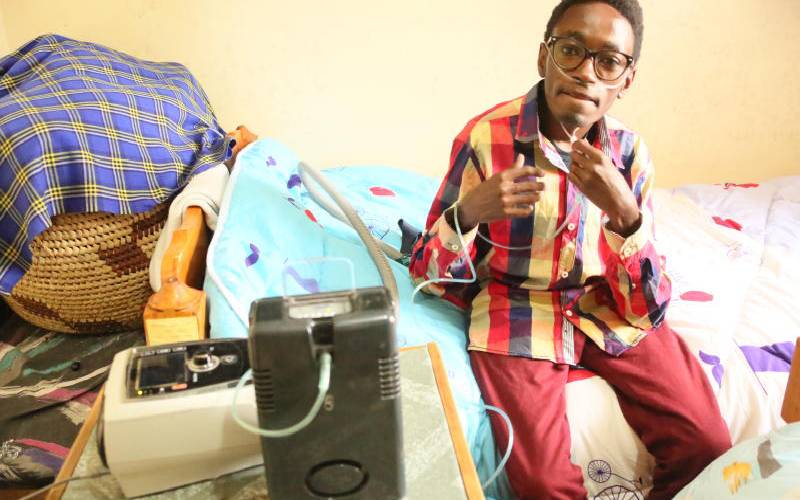
Collins Mwangi, 19, at his home in Nanyuki, Laikipia. He suffers from a respiratory disorder. [Kibata Kihu]
Catherine Kiama has for weeks been keenly following local and international news on the coronavirus pandemic.
For Ms Kiama, the spread is cause for concern. Every single new case reported locally is a reason for her to worry about the safety of her son, Collins Mwangi, who suffers from a respiratory disorder.
“I have been following what Covid-19 is doing to patients and the news worries me. I fear to think what would happen if my son catches it yet he has compromised lungs,” says Kiama.
Mwangi is battling lung failure (respiratory failure) and for four years, has been relying on two assistive breathing machines - oxygen concentrator and a ventilator - for survival.
The spread of the virus and the assertions that it is deadlier to people with underlying health conditions worries Kiama, who knows only too well that her son’s safety depends on how best Kenyans will follow the guidelines to halt its spread. Mwangi, 19, interchangeably uses an oxygen concentrator and a ventilator to boost the ability of his lungs to take in oxygen and exhale carbon dioxide from other body organs.
Body organs
Respiratory failure occurs when lungs fail to properly remove carbon dioxide (waste gas) from the blood, causing harm to vital body organs.
“I have been watching videos of how hard Covid-19 patients struggle to breathe and I can relate. It reminds me of how I struggled to breathe before I got used to using the machine,” Mwangi says.
He adds: “I can only imagine what the disease could do to my lungs because just a common flu affects my breathing.”
Mwangi says he hardly leaves the house ever since the first Covid-19 case was reported in Kenya. “We are not allowing visitors into the compound. I am following every instruction to protect myself against the disease,” he says.
He also admits to spending a lot of time reading articles about Covid-19, if only to understand more about the disease.
Kiama says while it may appear normal for many to simply breathe in clean air and exhale waste air, an hour or two of Mwangi not using the devices puts his life in danger because of the low oxygen and a high carbon dioxide levels in his blood.
As cases of the novel coronavirus continue to rise, medics say the use of ventilators will be crucial, especially for critically ill patients.
Just like the medical personnel are calling for more supportive equipment in case the situation gets to a full blown crisis, Mwangi relates to the need since he understands that a ventilator draws a thin line between recovery and death for patients with respiratory illnesses.
Life was normal for Mwangi until December 2015 shortly after sitting his Kenya Certificate Primary Education exams when he collapsed due to pneumonia.
Low oxygen level
Initially, Mwangi was diagnosed with Dextrocardia - a rare condition in which the heart points toward the right side of the chest instead of the left. However, after medical observation for three months, Mwangi was diagnosed with Respiratory Failure Type 1 condition whereby the body has low oxygen level. The diagnosis was made at Kenyatta National Hospital.
The condition later worsened to Respiratory Failure Type 2 - high concentration of carbon dioxide in the blood. Doctors advised he uses the two machines together.
Since 2016, he has been using oxygen concentrator for 18 hours during the day and six hours on a ventilator during the night. “The two devices cost us Sh1.2 million because the doctors instructed us they have to be portable,” he added.
The first born in a family of two said his greatest fear is catching coronavirus.
Mwangi has been confined at his grandparents’ home. “I stay in an apartment where people use kerosene stoves and charcoal. The air may be polluted. We are keeping him away from crowded areas so that he isn’t exposed to pollution,” his mother added.
After Kenya confirmed the first case of coronavirus on March 13, Kiama said she had to close her business at Likii trading centre, fearing that her movements could risk her son’s health.
“I stayed home for three weeks. I only resumed last week after the government banned movements from and in Nairobi,” she noted.
“I avoid interacting with people for my son’s sake. My customers have to sanitise at my M-Pesa shop. Everyone at home knows they cannot risk to expose Mwangi and his grandfather who suffers diabetes and hypertension,” said Kiama.
Mwangi, a former student of Nanyuki High School, scored B+ in last year’s KCSE exams. The school was supportive and allowed him to be a day scholar. Kiama said his classmates would receive him at the gate to help carry the oxygen concentrator and connect it to a socket.
Having missed his chance to pursue medicine in the first selection, Mwangi hopes that Kenya University and College Central Placement Service will consider him in the second revision of courses.
 The Standard Group Plc is a multi-media organization with investments in media platforms spanning newspaper print
operations, television, radio broadcasting, digital and online services. The Standard Group is recognized as a
leading multi-media house in Kenya with a key influence in matters of national and international interest.
The Standard Group Plc is a multi-media organization with investments in media platforms spanning newspaper print
operations, television, radio broadcasting, digital and online services. The Standard Group is recognized as a
leading multi-media house in Kenya with a key influence in matters of national and international interest.











